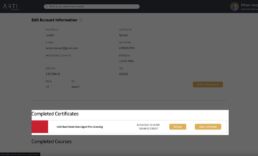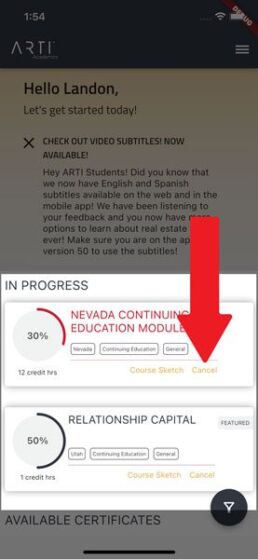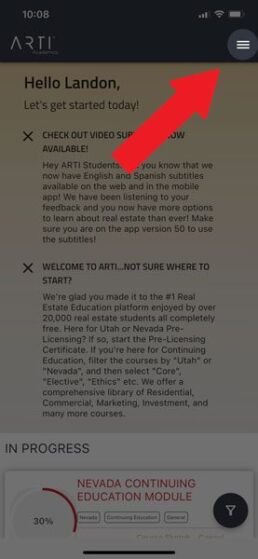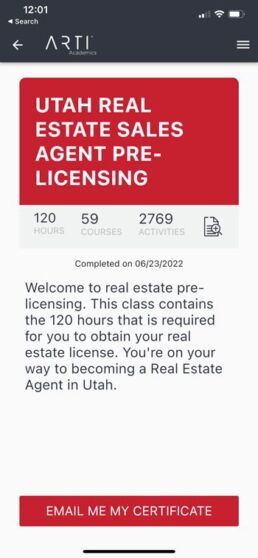How To Sign Up For Test Prep
Signing up for test prep on your computer?
1. Log into your account (https://lms.artiacademics.com/)
2. Click on the logo in the upper right had corner
3. Click on “Test Prep Sign Up” from the dropdown menu
4. Fill out and submit the form
Signing up for test prep on your mobile app?
1. Open the app and click on the menu icon in the upper right-hand corner
2. Click on “Test Prep Sign Up” from the menu list
3. Fill out and submit the form
* The test prep form will be emailed directly to your coach and they will reach out to you to confirm the time and day for your test prep.
** Still need additional help? Send an email to support@artiacademics.com
The ARTI® Academics test prep is a learning tool designed to increase students’ performance on the real estate examination. We are proud of our test prep and students completing the 1 on 1 in-person test prep do significantly better on the real estate license exam. The test prep is delivered live and in person by expert instructors from multiple locations in Utah and Nevada and only takes 30 minutes. Our exam preparation includes practice exams, educational material, and classroom lectures.
Our expert instructors have been certified by ARTI Academics, will answer all real estate school questions, and provide good test-taking skills. They will also answer any general real estate career questions you may have. Be sure to carefully review all practice tests and remember that test-taking difficulties can be overcome through practice.
How to View Your Completed Classes
Not Sure What Classes You Have Completed?
Desktop
To view your completed classes, follow these steps:
- Click on the logo in the top right corner of the website
- Click “Account”
- Scroll down to your completed classes
Mobile
How to view your completed classes on the mobile app:
- Click the menu in the top right
- Click “Completed Classes”
NOTE: You will not see this text if you do not have any completed classes.
About ARTI® Academics
ARTI® Academics is the Highest-Rated Real Estate School in Utah and Nevada, and is 100% Free. The school offers both Pre-Licensing and Continuing Education courses in an online video format to enhance your knowledge and build your real estate skills.
Having Trouble With Your Sound?
What To Check If Your Sound Isn't Working
There are 3 things to check if you are having trouble with your sound:
- Sound volume on your speakers
- Sound settings on your computer
- Sound volume on the video controller
About ARTI® Academics
ARTI® Academics is the Highest-Rated Real Estate School in Utah and Nevada, and is 100% Free. The school offers both Pre-Licensing and Continuing Education courses in an online video format to enhance your knowledge and build your real estate skills.
FAQ's
Frequently Asked Questions
Need support with ARTI Academics? Chances are that someone else has already asked the same question that you have. Please read through these frequently asked questions and use the links provided to find the answers.
Navigating ARTI Academics
Click Here to learn how to cancel a class
Click here to learn how to view your completed classes
Certificate of completion not in your inbox? Click Here
Click Here to learn about editing your ARTI Academics information
Click here to learn about how you can fix the sound
Continuing Education
Wondering when your credits will be banked? Click Here
Check with your state to make sure you are taking the required CE classes. Continuing Education classes differ from state to state and in some cases based on first-year real estate agents.
Once you know the required classes you need to take, you can find them through our filtering system in your ARTI account. Any class tagged with “Utah” has been approved for the state of Utah. You will also find classes tagged as “UT Core” and those classes are approved as core credit classes. All of our tags are directly applicable for the type of state as well as the type of CE credit approved.
New To Real Estate
Click Here to learn about getting started with real estate school and what class you need to take to receive a real estate license.
Click Here to learn more about Test Prep
You do not need to physically live in Utah or Nevada to obtain a real estate license in that state. However, our classes are only approved for the state that corresponds with that class. For example, taking the “Nevada Real Estate Sales Agent Pre-Licensing” class is only valid towards obtaining your real estate license in Nevada.
Right now ARTI Academics has been approved for Nevada and Utah.
Current real estate agents and real estate agents whose licenses have expired may qualify for an education waiver from the state. This waiver reduces the number of credit hours you will have to take. You can contact the state in which you are looking to obtain a real estate license to see if this applies to you.
If you have a state-issued education waiver please email an attachment of it to support@artiacademics.com. We will then guide you to a class with the appropriate credit hours.
Yes. All of our classes our FREE for now and forever!
Learn more about the cost of real estate by CLICKING HERE
Click Here for more information about your certificate of completion and when you will receive it
Click Here to learn about pre-licensing timelines
About ARTI® Academics
ARTI® Academics is the Highest-Rated Real Estate School in Utah and Nevada, and is 100% Free. The school offers both Pre-Licensing and Continuing Education courses in an online video format to enhance your knowledge and build your real estate skills.
How to Cancel a Certificate / Course
ERROR: You may only be signed up for 1 certificate / course at a time
You may have tried to sign up for a certificate or a course and received the error “You may only be signed up for 1 certificate at a time” or “You may only be signed up for 1 course at a time.”
To get rid of this error you either need to finish your “In Progress” certificate/course or cancel it. If you choose to cancel your “In Progress” certificate/course you will lose all of your progress in that class.
How to Cancel
Desktop
After signing in you will be brought to the dashboard. The default order in which things will be displayed are:
- Greeting message
- Notifications
- In Progress Certificate / Course (if any)
- Available Certificates
- Available Courses
You will need to click anywhere on the “In Progress” class that you would like to cancel. An information window will pop up and then you cancel select “Cancel Certificate” or “Cancel Course” in the bottom left hand corner of the popup.
Mobile
After signing in you will be redirected to your dashboard. The order that items are displayed is the same as the desktop version.
- Greeting message
- Notifications
- In Progress Certificate / Course (if any)
- Available Certificates
- Available Courses
To cancel an “In Progress” class all you have to do is tap the “Cancel” button on that particular class.
About ARTI® Academics
ARTI® Academics is the Highest-Rated Real Estate School in Utah and Nevada, and is 100% Free. The school offers both Pre-Licensing and Continuing Education courses in an online video format to enhance your knowledge and build your real estate skills.
How to Edit Profile Information
Edit Your Profile Information
It is important that the information in your ARTI Academics account is current and up to date for many reasons. The biggest reason is to ensure you receive credit for the work you have done. Make sure your name matches your legal name on paper and if you have a real estate license number, that needs to be added to your account to receive credit for continuing education.
** If your email address has changed please email support@artiacademics.com and request an email update. Please include the old and new email along with the reason for the change and we can update that for you.
Desktop
After signing in, click on the ARTI logo in the top right corner, select “Account” then click the edit button next to the text, “Edit Account Information.” Then you can edit any account info and select the finishing editing button after.
Mobile
After signing in, click on the on the menu icon in the top right. Select “Account” and then update your account information. This will automatically save.
About ARTI® Academics
ARTI® Academics is the Highest-Rated Real Estate School in Utah and Nevada, and is 100% Free. The school offers both Pre-Licensing and Continuing Education courses in an online video format to enhance your knowledge and build your real estate skills.
Certificate of Completion: Not In My Inbox
Can't Find Your Certificate of Completion?
Upon completion of any certificate or course, you should receive an email with a certificate of completion. If you do not see an email in your inbox, please do the following:
- Make sure you have completed test prep *If you haven’t completed test prep you will not be able to receive your certificate until then.
- Check your spam/junk folder
- Resend the email by following the steps below.
How to Resend your Certificate
Mobile App
After signing in, click on the menu in the top right corner and select “Completed Classes.” Then choose the class you would like to receive a certificate for and click the button “Email Me My Certificate” at the bottom of the page. A new email will be sent to the email on file.
Desktop
After signing in, click on the ARTI logo in the top right corner, select “Account” then choose the class you would like to receive a certificate for, and click the button “View Certificate.” Your certificate should then download to your computer.
About ARTI® Academics
ARTI® Academics is the Highest-Rated Real Estate School in Utah and Nevada, and is 100% Free. The school offers both Pre-Licensing and Continuing Education courses in an online video format to enhance your knowledge and build your real estate skills.
Is Your Brokerage Ready?
REALTORS: IS YOUR BROKERAGE READY?
Things to look for when choosing a brokerage
The industry is changing faster than most of us would like to admit. Nostalgic efforts to preserve the status quo are the biggest threat to our business. What if your new cell phone was exactly the same as last year’s model? What if your internet speeds never improved? What if your brand new car was the same as the previous model year? We are conditioned to look for improvements in service, performance, and quality. Client expectations in real estate are no different.
Is your brokerage ready for the technology and business model transformations that are shaping the industry? Adapting to current conditions isn’t good enough anymore. Wayne Gretzky, the greatest hockey player of all time said: “A good hockey player plays where the puck is. A great hockey player plays where the puck is going to be.” Today, the real estate industry is changing very fast. If you want to stay in the game, you need to be agile and play where the puck is going–not where it is today. Lose focus and you will be left behind.
ERA Brokers is constantly adapting, innovating, upgrading, and investing in our business on behalf of our agents and their clients. When was the last time your broker invested in you? Stop watching from the sidelines and start closing more business by anticipating market changes, not just reacting to them. Come see what continuous improvement in marketing, technology, and support platforms looks like in a real estate brokerage.
About ARTI® Academics
ARTI® Academics is the Highest-Rated Real Estate School in Utah and Nevada, and is 100% Free. The school offers both Pre-Licensing and Continuing Education courses in an online video format to enhance your knowledge and build your real estate skills.
New CE Classes: International Clients
International Clients
As a real estate professional working with clients from various backgrounds is an integral skill in today’s market. It is necessary to have an in-depth understanding of various cultures, communities, and backgrounds. As the premier online real estate school in Utah and Nevada, we are striving to advance real estate professionals with new skills to connect effectively with the global market and consumers. With that being said, the ARTI academics team has created new continuing (CE) education classes on how to work with international clients, how to develop cultural intelligence (CQ), and to truly understand intercultural competence. As an online real estate school, our systems are purposefully designed to help agents and instructors connect and to create an intuitive learning experience. Therefore, our classes are designed in a unique format to be interactive, engaging, and motivational.
Be sure to visit the ARTI academics catalog for upcoming fall classes and follow us on Facebook and LinkedIn.
About ARTI® Academics
ARTI® Academics is the Highest-Rated Real Estate School in Utah and Nevada, and is 100% Free. The school offers both Pre-Licensing and Continuing Education courses in an online video format to enhance your knowledge and build your real estate skills.
New Trends and Summer Classes
New Trends and Summer Classes
As we are looking ahead and the real estate trends are changing, the ARTI academics team is diligently working on classes that are more applicable to our changing marketing conditions and helping our agents to develop their relationship capital with their clients, communities, and fellow agents. As the premier online real estate school in Utah and Nevada, we are curating new content that is beneficial to our agents and to propel their business forward. Additionally, our classes will include real life scenarios and vignettes. We believe that real life application is conducive to learning. We understand that real estate is continuously evolving, and no two days are the same. With that in mind, we are focusing all our efforts to creating valuable content.
So, you might be wondering what are some of these new and exciting classes?
We are excited to inform you that we are creating classes about overcoming barriers in real estate, problem solving strategies, understanding external factors, and how to adapt to new real estate trends, conditions, and rapidly changing market cycles.
As an online real estate school, our systems are purposefully designed to help agents and instructors connect and to create an intuitive learning experience. Therefore, our classes are designed in a unique format to be interactive, engaging, and motivational.
Be sure to visit the ARTI academics catalog for upcoming summer classes and follow us on Facebook and LinkedIn.
About ARTI® Academics
ARTI® Academics is the Highest-Rated Real Estate School in Utah and Nevada, and is 100% Free. The school offers both Pre-Licensing and Continuing Education courses in an online video format to enhance your knowledge and build your real estate skills.






















